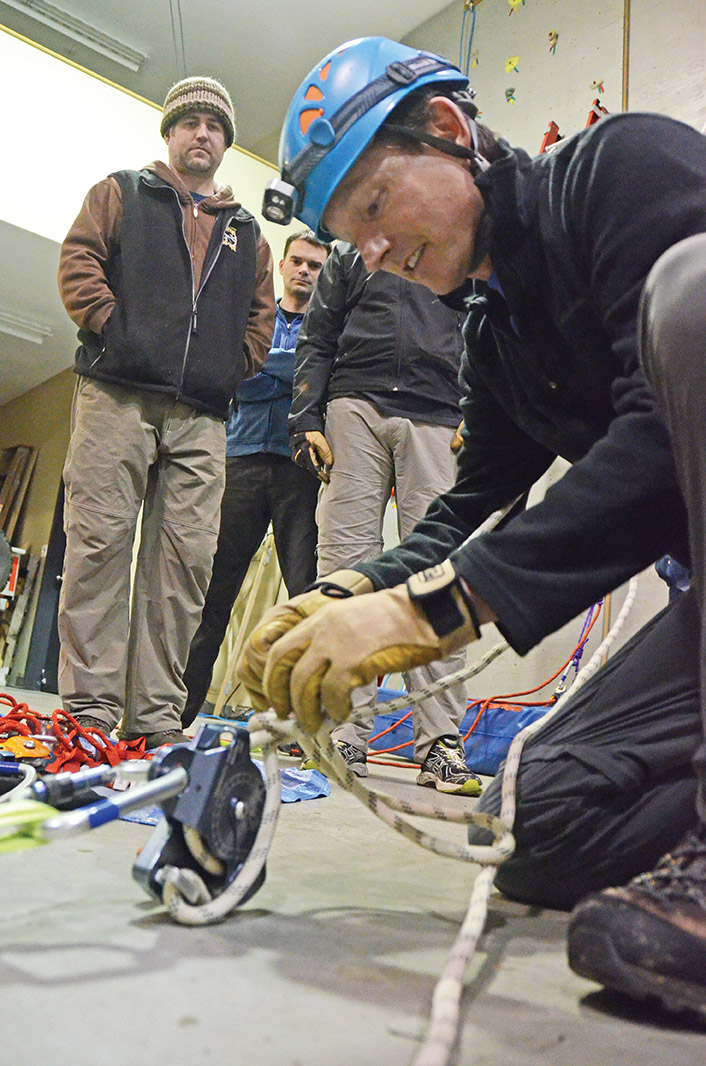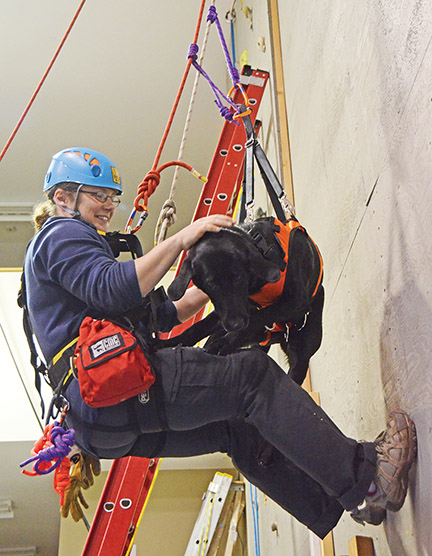Campbell River Search and Rescue (CRSAR) volunteers put in over 9,400 hours last year helping keep our community – and visitors to our area – safe when they venture outside to enjoy our beautiful region.
Local machinist Brent Finnerty, who is going into his third year with the organization, put in more than his share of those hours – and he wouldn’t have it any other way.
“I love it,” Finnerty says, as he prepares for a Tuesday night training session at the team’s headquarters in Willow Point.
“I told my wife when I joined that I was just going to take it easy and do a year of getting into it slowly and see how it goes,” he laughs, “but in the first year and a half, I’ve done swift water training, avalanche training, alpine training … I just dove right in.”
Born and raised right here in Campbell River, the 45-year-old Finnerty has always been somewhat of an outdoorsman, he says, “but nothing like what I’ve gotten into since I joined up with these folks.”
Sure, he used to go hiking in the woods and spend some time in and around the water, but in his first year on the SAR team, he had alpine training where he learned to travel on glaciers, avalanche training, swift-water rescue training and training on various all-terrain vehicles.
“The sky’s the limit in terms of the amazing opportunities I’ve had since I joined,” he says. “I even went up on a long-line exercise where I hung on a line underneath a helicopter. Never in a million years would I have ever imagined I’d get to do something like that. It was so awesome. It was like a dream.”
And it’s not just the physical challenges and technical knowledge he’s developing as part of CRSAR that he appreciates.
“I’ve never really been what I would call a ‘leader,’” he laughs. “I don’t really like being ‘The Guy.’ I never expected to be in the lead role doing stuff I’d never done before I joined, and if someone would have told me I’d be doing that, I would have probably been, like, ‘I’m not so sure about that.’ But it’s been another aspect that has come out in me that I was really quite surprised by.”
But it’s not all action movie heroics and leadership training and daring wilderness rescues plucking stranded hikers off the side of cliffs with helicopters.
“There are some not-so-glamorous parts, sure,” he says. “You get calls, and you grab your stuff and hurry down here, and the plan is made, and you get on the road, and by the time you’re halfway there, the mushroom picker shows back up at his camp five hours late, and you’ve driven all the way to Port McNeill in the middle of the night and you just have to turn around and come home. There’s definitely some un-super-hero type stuff,” he laughs.
And then there are the times when things don’t work out. Like any emergency response, there are times of tragedy.
“We’ve had some calls …” he pauses to think of how to express it. “It’s part of the job. I mean, it’s not a job, because we’re all volunteers, but it’s something that you just have to realize … not everything is going to have a good outcome, and you can’t let it get to you.”
When it does get to them, however, Finnerty says there is an excellent support system in place.
“CISM – Critical Incident Stress Management – the support system we have, always comes into play when there’s been a task where we feel it’s needed, and it’s very important and it’s great that it’s in place,” he says.
Another thing that needs to be in place is funding. In that regard, according to CRSAR manager Tim Fairbank, the Campbell River team is fortunate they are in a community like this one.
“Staying equipped and trained can be an expensive undertaking,” Fairbank says, “and the North Island community has been very good to CRSAR.”
Finnerty agrees. “Our community is very supportive of us. Very supportive. We’re very lucky.” Which is good, because, as Finnerty says, “the area we have to cover is huge, and we have a lot of different types of terrain, which need different types of equipment to manage.”
CRSAR’s territory is from Oyster River north on Vancouver Island, across the water to the West Coast of the mainland, up as far as Cape Scott and beyond into the coastal inlets as far as Bella Bella.
“We are in the top 15 per cent, or so, of the 80 groups in BC in terms of call out volume,” Fairbank says, adding that, “the demand for our services has been growing steadily overall around the province, as more and more people get out and enjoy the outdoors.”
The group puts on an 80-hour course each winter for people interested in becoming members and Finnerty says he recommends it for anyone who wants to make a difference in their community and region.
“Do you need a ton of available time? Not really. I think you need to put in 100 hours of volunteer time a year. It’s not horribly hard to meet that commitment.”
He does say, however, that it’s a lot easier for some than for others. “I’d always wanted to be a part of it,” he says, but he had to wait until his situation in life was more conducive to taking the opportunity.
“I love the outdoors, but I kind of had to wait until that point in my life when, you know, the kids are older, and financially and job-wise … well, I have the freedom at this point in my career to be able to leave when I’m needed for this. That’s probably the biggest barrier for people wanting to be members, if there is one. It’s not like you have to be in the best shape, or be the best climber or anything. That stuff comes with the training.”
You also need a supportive and understanding partner – if you’ve got a partner. Like Finnerty’s wife, Erin, for example.
“There have been nights when the call comes in at 3 a.m. and I’m running around the house grabbing my gear and throwing things together, and my wife – bless her heart, she’s such a big support – is throwing together some burritos or something so I can have a bite to eat before I run out the door,” he laughs. “But I wouldn’t trade it for anything.” And Erin understands that.
For more information on the team, including their recruitment program or ways to donate to their cause, head over to crsar.ca.
